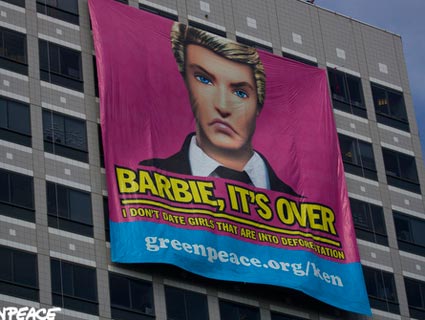
Photo courtesy of Greenpeace.
Barbie is moving her dream house out of the Indonesian rainforest. On Wednesday, Mattel announced that it will stop using paper products from companies “that are known to be involved in deforestation.” This comes after a major Greenpeace campaign to convince the toy giant to ditch problematic packaging, specifically paper from the company Asia Pulp & Paper.
Mattel has issued new “sustainable sourcing principles” which include maximizing their use of post-consumer recycled content, avoiding fibers from “controversial sources,” and increasing the use of third-party certified sustainable products.
Earlier this year, Greenpeace conducted testing on packaging for Barbie, one of Mattel’s best-known products, and found that the fibers came from the environmentally fragile Indonesian rainforest. The group also dinged Mattel for using products from Asia Pulp & Paper, “a pulp and paper company notorious for destroying Indonesian rainforests, including the habitat of the endangered Sumatran tiger.” Other major US companies, like Staples, Office Depot, and Target, had already stopped using paper products from the company. (Our own Kiera Butler has also blogged about APP’s ties to tea party groups.)
As the Los Angeles Times reported on Wednesday, Mattel has now joined the ranks of companies shunning APP:
Mattel spokesperson Jules Andres said the company this summer directed its suppliers “to not source paper and pulp from Asia Pulp & Paper. She said Mattel’s new policy “directs our printers not to contract with controversial sources,” and that Mattel considers Asia Pulp & Paper “a controversial source.”
It’s a big win for Greenpeace, which ran a major campaign that featured Ken breaking up with Barbie because, he said, “I don’t date girls that are into deforestation”:
UPDATE: An APP spokesman sent along this response to Mattel’s decision to drop the company, on behalf of sustainability and public outreach manager Ian Lifshitz. The response doesn’t really rebut concerns about the company’s practices:
Asia Pulp & Paper applauds Mattel’s commitments to recycling, wood legality, protection of High Conservation Value Forest, respect for the rights of indigenous peoples and robust auditing and certification procedures. These principles very much mirror AP’’s philosophy and environmental commitments and we are delighted to see a major global toy manufacturer adopt the same.
APP supports all credible industry certification, however, we strongly urge companies to not limit their procurement policies to one standard, in this case FSC, which discriminates against products from Indonesia and other developing markets. APP supports policies that protect both the environment and the vital income which developing countries receive from the pulp & paper industries.










